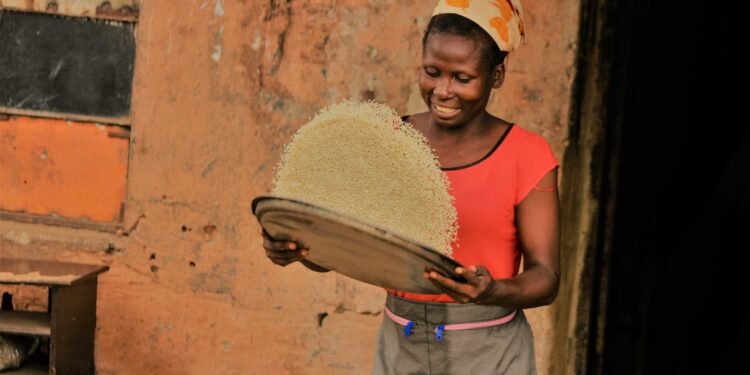Nigeria is projected to import 2.1 million metric tons of rice in 2024, which may make the country the top rice buyer globally.
This is according to the latest Rice Outlook report by the Economic Research Service of the U.S. Department of Agriculture (USDA).
The report notes that global rice trade will hit about 52.85 million tons (milled basis) by 2024, with more exports expected from Brazil and South Korea, and more imports expected from Burkina Faso, Indonesia, and Nigeria.
It read:
- “Global rice trade in the calendar year 2024 is projected at 52.85 million tons (milled basis), up 345,000 tons from the previous forecast but 460,000 tons smaller than the year-earlier revised forecast of 53.3 million tons. Export forecasts for 2024 are raised for Brazil and South Korea, while import forecasts are raised for Burkina Faso, Indonesia, and Nigeria, with Indonesia’s import forecast raised 600,000 tons to 2.0 million tons.”
Weaker Crops in Nigeria
According to the report, weaker rice production is expected in Nigeria and seven other countries.
The report noted:
- “Rice production is projected to continue to decline in Japan and South Korea due to diet diversification and declining and aging populations. Weaker crops are also projected in 2023/24 for Costa Rica, Ecuador, Mali, Nigeria, Turkey, and Uzbekistan.”
It added that global rice production in 2023/24 is projected at a record 517.8 million tons (milled basis), which is a decrease of 340,000 tons from last month’s forecast but 4.4 million tons larger than a year earlier.
Out of the projected rice production figure, Nigeria is expected to produce about 5.23 million tons.
Top rice importer
Data from the report also showed that Nigeria will likely be the leading importer of rice in 2024.
The country will be followed by Indonesia with an import projection of 2 million metric tons and Brazil with a projection of 900,000 metric tons.
It noted that the import forecast for Nigeria was raised by 100,000 metric tons from the earlier projection in October.
On the reason for the increase, the report noted: “Import forecast is raised based on stronger-than-expected demand for imported rice due to both high prices for domestic rice and quality concerns.”
More insight
The Central Bank of Nigeria (CBN) recently lifted the foreign exchange restrictions it placed on importers of rice and 42 other items eight years ago.
This will likely encourage the importation of more rice, among other items, into the country.
There have been mixed reactions following the removal of the restrictions, with some farmers recently showing support for the lifting of the foreign exchange ban on rice importation.
According to this group of farmers, the lifting of the forex ban breaks the monopoly of the processing and marketing of grain by local millers.
Prior to the bank, there appeared to be a decrease in rice import, with data from the Thai Rice Exporters Association (TREA), showing a decrease of 98.4% between the first seven months of 2022, and that of 2021.
However, there is also a likelihood that foreign rice is likely smuggled more than it is officially imported into the country.
About a week ago, the Nigeria Customs Service said it seized 13 trailer loads of foreign parboiled rice, among other items.

























What is the rationale for killing local farmers in Nigeria and boosting imports?
It is on record that the local production has been instrumental to a phenomenal rise in Nigeria meeting the country’s rice needs but this information is not a positive decision to the multitude of Nigerians who have invested almost 3 billion USD to get Nigeria into the club of self sufficiency in food.Same decision to unban the importation of rice is counterproductive and exceedingly dangerous in view of the global food crisis bedeviling us.
Nigeria will never be self-sufficient in local rice production, infact any other farm produce when producer associations over depend on government for everything they can do such as funding their activities through internal capitalization. They need to upgrade to become suitable partners for agribusiness development in all aspects. They need to get highly organized at the grassroots. Which farm producer association in the country holds annual general meeting (AGM) that published approved annual report? When last did these associations hold democratic election at the end of the ExCo’s office tenure. Only in this country there exist a national apex farmer association with two corporate registration certificates. Haba! Who are we decieving? Which farmer association has memership and commodity database for quick retrieval of information. Never forget to know that imported food to Nigeria comes from new generation farmer cooperatives working under ppp venture operation. To be self-sufficient in farm produce we need to be so in our thinking, action and sincerity of purpose and vision..
The government need to review import duty on rice downwards